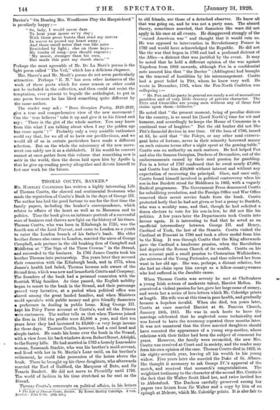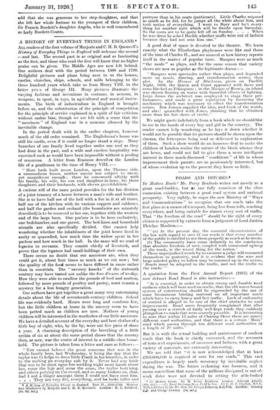THOMAS COUTTS, BANKER.*
Mu. 1TARTLEY COLERIDGE has written a highly interesting Life of Thomas Coutts, the shrewd and sentimental Scotsman who made the reputation of Coutts's Bank in the days of George The author has had the good fortune to use for the first time the family papers, including the banker's correspondence, which relates to affairs of the heart as well as to Mammon and to politics. Thus the book gives an intimate portrait of a successful man of business and throws new light on the history of his times. Thomas Coutts, who was born in Edinburgh in 1735, was the fourth son of the Lord Provost, and came to London as a youth to enter the London branch of his father's bank. His elder brother James also came to London, married the niece of George Campbell, sole partner in the old banking firm of Campbell and Middleton at "The Siga of the Three Crowns" in the Strand, and succeeded to the business. In 1761 James Coutts took his brother Thomas into partnership. Ten years later they severed their connexion with the Edinburgh bank, and in 1775, when James's health had failed, Thomas became sole owner of the Strand firm, which was now and henceforth Colitts and Company. The founders of the bank had a personal connexion with the Scottish Whig families. As time passed, the English nobility began to resort to the bank in the Strand, and their patronage proved very lucrative, at a period when political office was shared among the great landed families, and when Ministers could speculate with public money and give friendly financiers a preference in dealing in public loans. King George III. kept his Privy Purse account at Coutts's, and all the Princes were customers. The author tells us that when Thomas joined the firm in 1761 the profits were £5,800 a year, and that ten years later they had increased to £9,000—a very large income for those days. Thomas Coutts, however, had a cool head and simple tastes. He made his home over the bank in the Strand, with a view from his back windows down Robert Street, Adelphi, to the Surrey hills. He had married in 1763 a homely Lancashire woman, Susannah Starkie, who was his brother's maid-servant, and lived with her in St. Martin's Lane until, on his brother's retirement, he could take possession of the house above the bank. There he brought up his three daughters, who afterwards married the Earl of Ouillord, the Marquess of Bute, and Sir Vraneis Burdett. He did not move to Piccadilly until 1795. The world of fashion in his time stretched as far east as the Strand.
Thomas Coutte's comments on political affairs, hi his letters
• Ths Life of Thomas Coati*, Banker. By Ernest Hartley Coleridge. 2 vols. London : Jolui Lnite. [42s. net.] to old friends, are- those of a detached observer. He knew all that was going on, and he was not a party man. The absurd theory, sometimes asserted, that financiers like wars did not apply in his case at all events. He disapproved strongly of the "cursed American war" and thought that it would ruin us. He was opposed to intervention in Revolutionary France in
1792 and would have acknowledged the Republic. He did not like the war that began in 1793 and had a profound distrust of the Allies—a distrust that was justified by the event. It may be noted that he held a different opinion of the war against Napoleon from 1803 onwards, although Fox in a confidential note assured him that "the Doctor" (Addington) had brought on the renewal of hostilities by his mismanagement. Coutts had a great belief in Pitt, whom he knew very well. He wrote in December, 1783, when the Fox-North Coalition was collapsing :—
" Mr. Fox and his party in general are surely a set of necessitous gamblers and of very little decency of private character. The Pitts and Grenvilles are young men without any of thee foul stains upon them—hitherto."
He noted that "the present moment, being of peculiar distress for the country, is as usual his [Lord North's] time for wit and humour, and accordingly he keeps the House of Commons in a continual roar of laughter." But the old banker did not like Pitt's financial devices in war time. Of the loan of 1796, issued at 85, he said that "the Foleys, or any other mad extrava- gant heirs of fortune, never in their minority borrowed money on such ruinous terms after a night spent at the gaming-table." Coutts was an authority on such matters. He had helped Fox and also the famous Georgina, Duchess of Devonshire, out of the embarrassments caused by their mad passion for gambling.
Fox in a letter of 1787 confessed that he owed nearly £7,000, and Coutts lent him £10,000 without interest and without any expectation of recovering the principal. Once, and once only, Coutts found himself involved in political controversy when his son-in-law Burdett stood for Middlesex in 1802, with a vaguely Radical programme. The Government Press denounced Coutts for subsidizing revolution, and the Foreign Office and War Office removed their secret service funds from the bank. Coutts protested hotly that he had not given or lent a penny to Burdett, who was a wealthy man, and that, though he had solicited a dozen electors to vote for his son-in-law, he did not like his politics. A few years later the Departments took Coutts into favour again. It is interesting to find that he acted as an unofficial intermediary between George III. and Henry, Cardinal of York, the last of the Stuarts. Coutts visited the Cardinal at Frascati in 1790 and took a silver medal from him to the King. It was through Coutts that the King afterwards gave the Cardinal a handsome pension, when the Revolution had deprived the Roman Church of its wealth. Coutts on his own account paid a small pension to Clementina Walkinshaw, the mistress of the Young Pretender, and thus relieved her from want in her old age. She was, perhaps, a distant relative, but she had no claim upon him except as a fellow-countrywoman who had suffered in the Jacobite cause.
When Thomas Coutts was seventy he met at Cheltenham a young Irish actress of moderate talent, Harriet Mellon. He conceived a violent passion for her, gave her large sums of money, and wrote her a series of love-letters Which Mr. Coleridge prints at length. His wife was at this time in poor health, and gradually became a hopeless invalid. When she died, ten years later, Coutts at once married Ilarriot at St. Pancras Church, January 18th, 1815. He was in such haste to have the marriage celebrated that he neglected some technicality and was forced to have the ceremony repeated three months later. It was not unnatural that the three married daughters should have resented the appearance of a young step-mother, whose relations with their father had been the subject of comment for years. However, the family were reconciled, the new Mrs. Coutts was received at Court and in society, and the reader may form his own opinion of the case. Thomas Coutts died in 1822, in his eighty-seventh year, leaving all his wealth to his young widow. Five years later she married the Duke of St. Albans.
She thought it necessary to ask George IV.'s approval of the match, and received that monarch's congratulations. The
weightiest testimony to the character of the second Mrs. Gouda is the fact that Sir Walter Scott liked her, and twice invited her to Abbotsford. The Duchess carefully preserved among her papers two letters from Sir Walter and a copy by him of an epitaph at Melrose, which Mr. Coleridge prints. It is also fair to
add that she was generous to her step-daughters, and that she left her whole fortune to the youngest of their children, Sir Francis Burdett's daughter Angela, who is well remembered as Lady Burdett-Coutts.



































 Previous page
Previous page